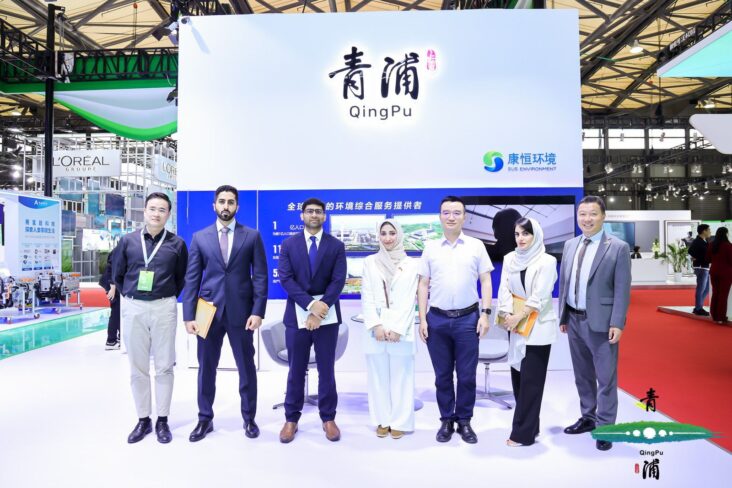Sharjah Delegation Wraps Up Shanghai Visit With 20+ Key Meetings To Boost Development And Economic Ties

At the conclusion of a seven-day visit to the People’s Republic of China, a Sharjah delegation led by the Department of Government Relations (DGR) held a series of meetings in Shanghai, the country’s most populous city and economic capital. Between June 6 and 8, the delegation deliberated in more than 20 meetings on sustainable urban management and advancing urban planning and exhibition development.
The Shanghai meetings encompassed a diverse range of topics, including the enhancement of human resource skills, Shanghai’s innovative endeavours in smart city infrastructure and technology museums, and initiatives aimed at empowering women. Additionally, discussions focused on supporting youth-driven projects and tackling broader developmental challenges. These comprehensive talks highlighted the importance of strategic partnerships in driving mutual growth, reinforcing the bond between the UAE and China, and paving the way for a collaborative future.
Shared Developmental Vision Based on Innovation and Knowledge
Sheikh Fahim Al Qasimi, Chairman of the Department of Government Relations, underscored the strategic importance of the Sharjah delegation’s visit to Shanghai. He viewed it as a significant stride towards exploring new avenues for collaboration, particularly in economy and urban development. “Sharjah and Shanghai share a development vision deeply rooted in innovation and knowledge. It opens up opportunities for cooperation on sustainable projects that can benefit both communities. Guided by His Highness Sheikh Dr Sultan bin Mohammed Al Qasimi, Member of the Supreme Council and Ruler of Sharjah, the emirate is committed to building communication bridges and strengthening economic partnerships with leading global entities in line with our developmental goals.”
Strengthening Cooperation in the Economy, Education, and Technology Sectors
On day one of the Shanghai visit, the delegation held 12 meetings. Leaders and directors from various Sharjah entities met with representatives from different economic, academic, cultural, and tourism institutions. These included the Shanghai Commission of Commerce, Fudan University, the Shanghai Women Federation, the Shanghai Science and Technology Museum, the Shanghai Astronomy Museum, the Shanghai Bureau of Ecology and Environment, the Shanghai Library, the Shanghai Urban Planning and Exhibition Centre, and the Shanghai Smart City Development Institute, and Shanghai Jiaotong University.
Commenting on the visit, H.E. Hussain Al Mahmoudi, CEO of the Sharjah Research, Technology, and Innovation Park (SRTIP), said: “We are dedicated to advancing the research and technology sector, bolstering Sharjah’s status as a hub for innovation and knowledge, and strive to make significant contributions to the emirate’s sustainable development journey. Partnering with Chinese research institutions underscores our commitment to international cooperation and expertise exchange, and we look forward to collaborating with various public and private organisations in research and technology to advance our capabilities and strengthen ties between China and Sharjah, making the emirate an appealing destination for Chinese investments in multiple sectors.”
Expertise Exchange and Best Practices
The second day in Shanghai featured 9 meetings with representatives from various Chinese public and private institutions. These included the Shanghai Tourism and Culture Bureau, the Shanghai Health Authority, the Shanghai Stock Exchange, the Lin-gang Free Trade Zone, the China Center for Urban Development and Reform at Shanghai International Studies University, the Shanghai Youth Centre, the Shanghai Museum, and the Shanghai Human Resources and Social Security Bureau.
Ali Mohammed Al Naqbi, CEO of Weqaya, Beeah Group, highlighted the importance of the visit, saying, “We are thrilled to be part of the Sharjah delegation to the People’s Republic of China, one of the world’s foremost economic powerhouses. The visit provided an opportunity to learn about China’s government, aviation, industry, and technology advancements. It enabled us to exchange ideas and expertise to benefit both sides, particularly in sustainability, recycling, AI applications, waste-to-energy, and medical waste treatment. Engaging with key stakeholders in these fields is crucial to our mission of promoting sustainability, environmental preservation, and achieving national environmental goals and the circular economy. This visit bolsters UAE-China relations and paves the way for promising new avenues of cooperation across multiple sectors.”
Cultural Landmarks
During their visit to Shanghai, the Sharjah delegation toured several of the city’s major cultural landmarks and attractions. These included the site of the First National Congress of the Chinese Communist Party, the West Bund Museum, the arts district, the Shanghai Urban Planning Exhibition Centre, the historic Yu Garden Street, the Shanghai Museum, and a river cruise on the Huangpu River.
Commenting on the visit, Aisha Rashid Deemas, Director General of Sharjah Museums Authority, stressed that the visit is focused on strengthening cooperation across cultural, commercial, and investment fields. “It is crucial in deepening our relations and exploring new opportunities, particularly in cultural exchange. By fostering broad cooperation and understanding, we support the development of bilateral relations. The authority is committed to strengthening cultural communication and bolstering bonds by organising various events, such as the ‘Moments in the Lives of Muslims in China – Through the Lens of Peter Sanders’ and the ‘Cultural Rapprochement between the UAE and China’, which celebrated our cultural connections with China.”
This Shanghai stop marked the conclusion of the Sharjah delegation’s seven-day visit to the People’s Republic of China, which took place from June 2 to 8 and included three major Chinese centres, including Beijing, Shandong Province, and Shanghai. The visit focused on strengthening government relations, exploring economic, cultural, and tourism cooperation opportunities, and consolidating bilateral ties in education, health, sports, technology, and innovation.


